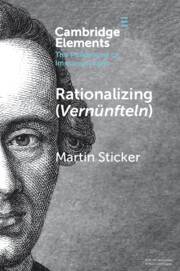Element contents
Rationalizing (Vernünfteln)
Published online by Cambridge University Press: 24 December 2021
Summary
Information
- Type
- Element
- Information
- Online ISBN: 9781108625661Publisher: Cambridge University PressPrint publication: 20 January 2022
